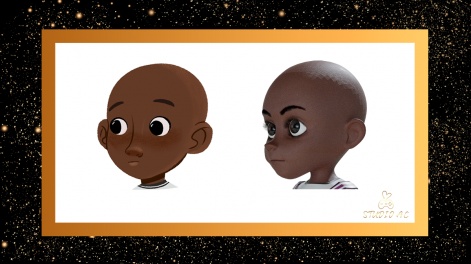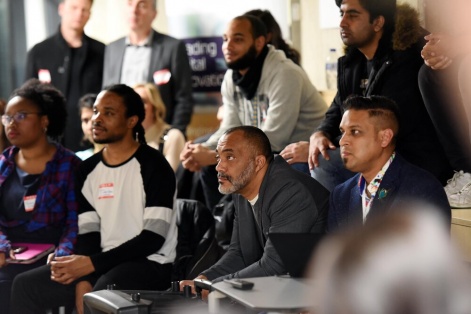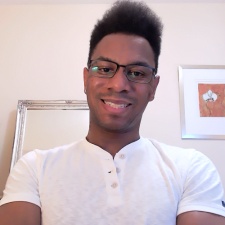For decades, no matter the industry, people of colour have suffered through a lack of opportunity and a lack of respect, leaving them stuck playing second fiddle throughout their careers.
The games industry is no different, and here at PocketGamer.biz we wanted to do our part and help bring attention to the many incredible people of colour that help make up this sector. That is why we are committing to a new long-term regular feature to spotlight these people and their careers.
So, welcome to our 'POC in Mobile' series, where discussion about finding a place in the games industry, the various challenges faced as a minority, and what truly needs to be done to make games more diverse will be the focal points of conversations.
This week, we spoke to POC in Play co-founder, StudioAC Games director and Azoomee director of product Adam Campbell about his various roles and how
PocketGamer.biz: Can you start off by telling us about your role in games and what it entails?
Adam Campbell: I wear multiple hats in games. I’m the director of product at Azoomee, the world’s fastest-growing kids media company, where I manage the product development strategy, as well as taking a leading role across the entire production team. We do apps, games and TV shows for kids.
We saw productions blend art, science, cinema and music in increasingly more interesting ways and I just had to be a part of the game making process.Adam Campbell
I’m also the director of StudioAC Games, my new independent games company and co-founder of POC in Play, which is Europe’s largest racial advocacy group for video games.
Why did you want to work in the games industry?
I always enjoyed games as a kid but at age 11 when I got a Dreamcast, my experience of Shenmue really changed my expectations of what was possible in games. Ironically, it was been discontinued the same month.
During that time, we saw productions blend art, science, cinema and music in increasingly more interesting ways and I just had to be a part of the game making process. I made it my aim to reach the video games industry.
What did you study (if anything) for your role? Are there any courses out there that you would advise for aspiring professionals?
I studied Computer Science with Games Technology at University. Initially, I thought the best route into the industry would be via programming, which probably makes about 40 per cent of job advertisements.

I also had a genuine interest in the way games worked. But my ambitions lied more in the production management and vision of products, so I made a couple of moves to get there through my journey. That said the technical experience continues to reap benefits.
What do you think should be done to improve diversity, not only across the games industry, but across all industries?
There are many ways we can improve diversity in the industry, but here are a few areas we can focus on:
- Close collaboration with education. This is one of the best ways to address the pipeline for future workers in the industry, though we need to be better at targeting institutes with high proportion working class (the majority of the population) and ethnic minority populations. These students are less likely to get crucial access to the industry.
- Advertisement of roles should be broad and extend outside the usual circles to improve reach. Tapping into other people’s networks can be an advantage as is working with teams and agencies who can specialise in finding a broad range of potential candidates. A common complaint is that ‘diverse applicants aren’t applying’ but hiring managers should do the work if they want to find that hidden talent.
- Companies should improve their focus on career development and retention. Gender and ethnic minorities are statistically less likely to progress to higher levels or remain in companies. If this is addressed, the diversity of organisations shouldn’t tank each year.
Ultimately, diversity isn’t just a ‘nice to have’ it’s the nature of our society and it makes good business sense, particularly when industries like games are hungry for talent to build the next wave of experiences.
What are the biggest challenges you have encountered since joining the industry?
As a hiring manager myself, the best or most suitable talent isn’t always existing games industry people.Adam Campbell
Personally, it’s been career sustainability. Maintaining a career isn’t always easy and I’ve had to deal with redundancy along with figuring out how to move my career forward in the right direction.
Like many who work in games, I didn’t land the ideal job the first time around, and it took a bit of planning in order to move into my preferred passion - games production. The industry is a strong economic force but at the end of the day, you have to try to find a way to earn and be sustainable. This can mean keeping an open mind to what you’ll find and who you’ll work with.
What do you think can be done to help encourage more people of colour to get into games?
My first bit of advice is to know and recognise that you belong! It’s easy to be put off by the idea that people of your background may be a minority in the industry but you have every right to be there and all the potential in the world to grow and make a career.
Secondly, find your community and make use of social media. Twitter is where game dev lives and there are countless discord or other community channels and meet-ups. Seek out communities and organisations that also put an emphasis on diversifying industry or games content, as you’ll likely come across people with similar experiences. Use the community as a way to boost yourself and others you are in touch with.
My next piece of advice is to be really flexible. This goes from your studies all the way to your career search. When you’re studying, don’t be afraid to try out different things, just because you study games design, doesn’t mean you can’t try coding. Use studying as a time to boost your exposure to a number of topics that can help you in your career later, specialise if you feel a strong affinity to a particular subject.
When you’re about to go into industry, remember that you won’t necessarily get a pick of the role or studio you want to work for. Consider a broad range of jobs you could use as a starting point, knowing that later on, you can move around. Try to understand what prospective employers may do to help build your career.
Is there anything that recruiters should be doing differently to address the lack of diversity across not only games development but all industries?
One thing I’d like to encourage is more cross-industry recruitment. As a hiring manager myself, the best or most suitable talent isn’t always existing games industry people. There’s a lot to be learned and gained from other industries closely related, or maybe even from industries that are very different.

I’d also like to see more initiatives targeting entry-level and junior roles, as this is likely where we’ll see the biggest impact in the long term. It’s not an easy recruitment gap to fix necessarily but we need to widen access to the industry for bright new talent.
Since the surge in the #BlackLivesMatters campaign that took place last year, what changes (if any) have you seen from across the industry to address the issue?
The conversation around race is more apparent and companies seem more willing to vocalise their position on diversity, inclusion and social justice, which is a great start. This also means more pressure for such companies to be accountable to the pledges they made last year. Speaking honestly, there’s work to be done but it’s early days.






















